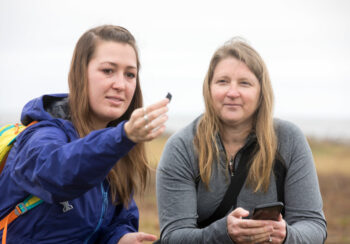The University of Georgia Delta Innovation Hub welcomed a new start-up earlier this October: InfraredRX, a biotechnology company founded by three UGA faculty members.
The creation of Kevin McCully, Kent Nilsson and Jonathan Murrow, InfraredRX’s mission is to discover, develop and deliver improved measures of skeletal muscle blood flow and mitochondrial function for use in bettering patient health.
“Simply put, our vision is to produce early versions of the Star Trek tricorder,” said McCully, president and chief scientific officer of InfraredRX. “We want to advance the use of noninvasive technologies to study skeletal muscle in patients with a wide variety of medical issues. And we want this use to help patients get better.”
The company was founded in 2014, when a grant opportunity came to McCully and Murrow. They had worked on a number of research projects together after Murrow came to Athens in 2008—McCully is a professor in the Mary Francis Early College of Education’s kinesiology department, Murrow is the campus associate dean for research and a professor of medicine with the AU/UGA Medical Partnership.
“The grant was looking for companies who were partnering with universities and interested in developing technology that can measure blood flow in tissue using near infrared light,” said Murrow, CEO of InfraredRX. “Well, that’s Kevin’s area of specialty and my area of clinical interest.”
They joined with Kent Nilsson, associate professor of medicine with the AU/UGA Medical Partnership, who specializes in electrophysiology and was an old friend of Murrow’s from their residencies at Johns Hopkins Hospital. The trio formed InfraredRX, Inc., to apply for this grant, and they’ve been working together ever since.
“Our efforts over the past six years or so have been to take knowledge and technology that Kevin has developed in his lab and translate that into a commercially viable product—hardware and software—that could be of use to other researchers and to clinicians in trying to understand how mitochondria in the muscle can be affected in different disease states,” said Murrow.
Thus far, the company has found success: They’ve received funding from the National Institutes of Health (NIH) and the Georgia Research Alliance, and they’re building a customer base within their market.
“Recently, we’ve had discussions with the FDA about clinical applications and have begun selling the software package to research labs around the world,” said Nilsson, the company’s chief medical officer. “Nearing the end of the first phase of our business plan, we are excited to pursue phases II and III, which involve using the technology to diagnose, intervene and treat diseases ranging from peripheral arterial disease to ‘long’ COVID-19 to statin-induced muscle pain.”
The company’s move to the Delta Innovation Hub figures to help considerably with the transition to these next phases, which will require, among other things, growing their team and learning how best to market their product. In this regard, InfraredRX is already enjoying one benefit of being part of the Hub: plugging into the broader UGA community. They are working with marketing and business analytics students from the Terry College of Business.
“I’m looking forward to InfraredRX’s continued integration in the Innovation District, but I’m also looking forward to other companies taking advantage of this opportunity,” said Murrow. “Because I think that for everything that Athens has, all the advantages here, there’s still so much potential waiting to be realized.”






